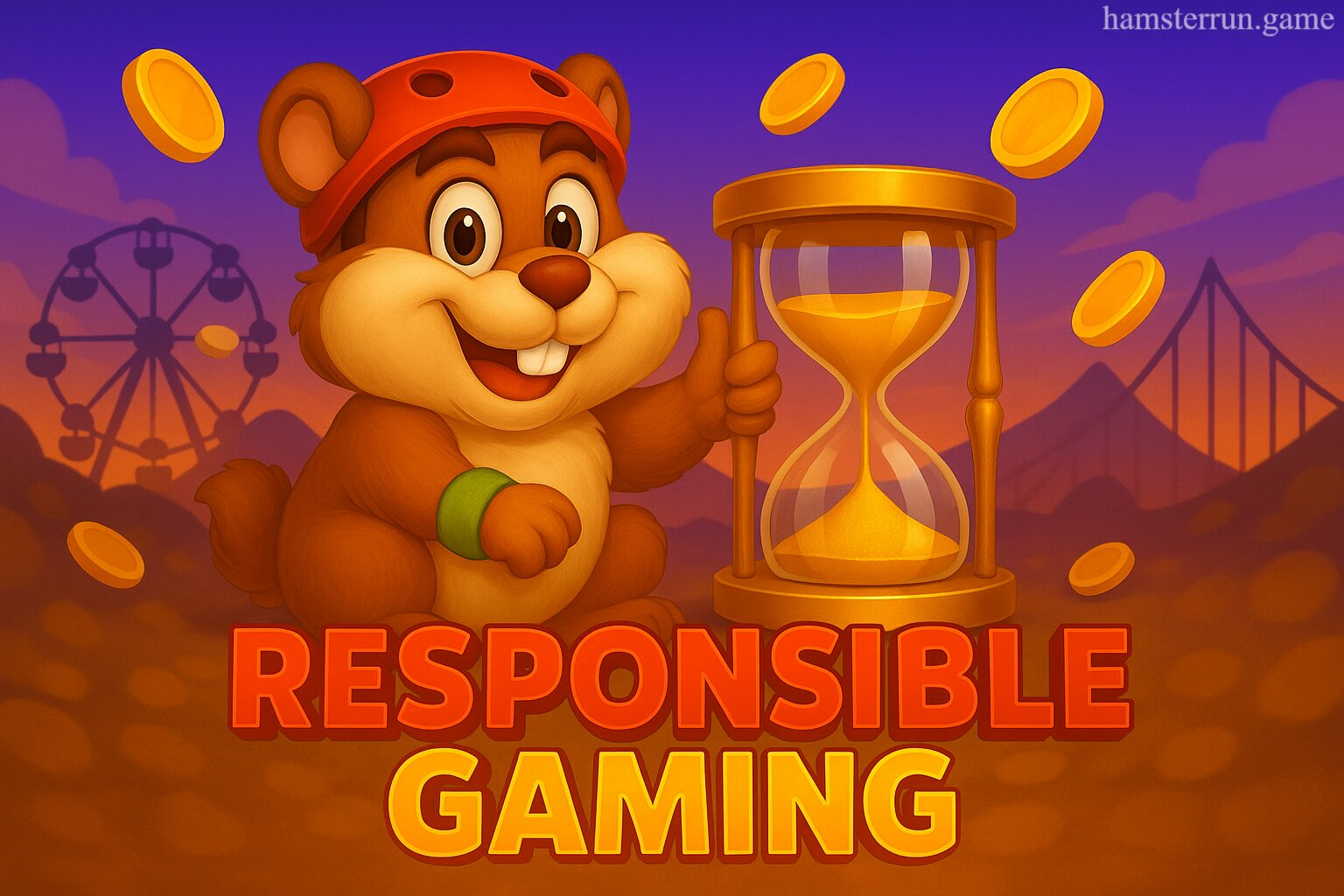Hamster Run is designed for play — and play should always feel good. That means staying in control of how often you play, how much you spend, and how it fits into your day.
Responsible gaming is about making conscious choices. It’s not just about limiting risks — it’s about protecting what makes the experience fun in the first place. When you play with intention, you keep it light, enjoyable, and part of a balanced life.
Why Responsible Gaming Matters
Hamster Run is fast, fun, and built for short, high-energy sessions. But even simple games can lead to unhealthy habits if played without limits. That’s why we take responsible gaming seriously — not as a warning, but as part of a good experience.
We want every player to feel in control. That means clear mechanics, optional spending, and tools that support healthy behavior. Our goal isn’t to stop you from playing — it’s to help you keep the fun sustainable.
Understanding the Risks
Hamster Run is designed for casual play, but like any game, it can become a problem if used as a way to avoid stress, escape daily life, or chase rewards.
Risks often appear gradually. You might play longer than planned, feel frustrated when you lose, or spend more than you meant to. Recognizing these patterns early helps you keep the experience enjoyable — and stop small problems from turning into bigger ones.
Emotional Impact
Games can affect how you feel, often in ways that aren’t obvious at first. A short burst of frustration or a restless evening might not seem like much — but over time, these patterns matter.
Watch for emotional signals such as:
- Feeling tense or on edge during or after play
- Frustration or irritability after losing
- Trouble focusing after long sessions
- Using the game to escape stress or boredom
Noticing these early can help you reset before they grow into habits.
Our Commitment to Safe Play
We want Hamster Run to stay fun — not frustrating or unpredictable. That’s why we build every part of the game to be transparent and fair. You won’t find hidden mechanics or pressure to spend. Our design choices support a safe experience that players can trust and enjoy long term.
Fair Game Design
Spending in games is normal — as long as it’s intentional. In fast-paced environments, it’s easy to tap “buy” without thinking, especially during long or emotional sessions.
To stay in control:
- Set a weekly or monthly budget
- Use platform tools to restrict spending
- Avoid impulse purchases during frustration
- Review your spending history regularly
These small steps help you make clearer decisions — and keep purchases aligned with your goals.
Self-Regulation Tools
We’ve built features to help you stay in control — whether you want to manage time, limit spending, or pause between sessions. These tools are optional, but they’re here if you need them.
| 🛠️ Tool | 🎯 Purpose |
| 💳 Spending limits | Set caps on in-app purchases to avoid overspending. |
| ⏰ Playtime reminders | Get notified after a set amount of time spent in-game. |
| 🔁 Cooldown periods | Add breaks between sessions to reduce overuse. |
| 🌐 Support links | Direct access to external help resources and advice. |
These features are designed to give you more choice, not less — so you can shape the experience around your own boundaries.
Tips for Staying in Control
Building simple habits around how and when you play can make a big difference. These aren’t rules — they’re tools. Use them to keep the game fun, clear, and in balance with the rest of your life.
| 🧠 Tip | ✅ How It Helps |
| ⏳ Set time limits | Decide in advance how long to play. Timers keep sessions short and intentional. |
| 💬 Track your emotions | Check how you feel before and after playing. If stress builds, pause. |
| 🔁 Don’t chase losses | Trying to win back what you’ve lost leads to frustration, not progress. |
| 🛑 Take regular breaks | Short breaks keep energy and perspective fresh — even during winning streaks. |
Supporting Players at Risk
Hamster Run is meant to be casual and fun. But if playing starts to feel compulsive, stressful, or harder to control, it may be time to take a step back.
Problematic habits often develop slowly. The sooner you recognize the signs, the easier it is to make a change. Support is available — and taking action early can protect your time, energy, and focus.
Recognizing Problematic Behavior
Not all signs of problem play are obvious. Sometimes they show up as small changes in routine or mood. Knowing what to look for helps you stay ahead of unhealthy patterns.
Watch for behaviors like:
- Ignoring responsibilities to keep playing
- Hiding how much time or money you’ve spent
- Feeling guilty, anxious, or irritated after playing
- Struggling to stop, even when you want to
- Using the game to escape from stress or boredom
If these feel familiar, it may be time to pause and reflect.
Where to Get Help
If you’re struggling to manage your play — or just want to talk to someone — help is available. These trusted global organizations offer free, confidential support for players and families.
| 🆘 Organization | 🌍 Description |
| 🇬🇧 BeGambleAware | UK-based charity offering tools and advice on safer gaming habits. |
| 🇬🇧 GamCare | Support service for individuals affected by gaming or gambling-related harm. |
| 🇺🇸 NCPG | U.S. National Council on Problem Gambling, with global prevention and treatment resources. |
| 🌐 International helplines | National mental health or addiction services in your country or region. |
For Parents and Guardians
Hamster Run is designed for a general audience, but younger players may need guidance. If your child plays the game, you can help shape a healthy experience by setting boundaries and talking openly about safe play.
Active involvement — not just restriction — makes a real difference. The right support at home builds habits that last beyond the game.
Using Parental Controls
Most devices and platforms offer built-in tools to help parents manage gameplay. These controls make it easier to guide younger players without constant supervision.
You can:
- Set daily or weekly screen time limits
- Restrict in-app purchases without approval
- Create child-specific profiles with age filters
- Schedule downtime to block access during certain hours
These features give you more control — and help your child develop healthier play routines.
Talking About Healthy Play
Rules work better when kids understand the reasons behind them. Talk openly about how games fit into the bigger picture — school, rest, friendships, and other interests.
Keep the tone supportive, not strict. Ask how the game makes them feel. Encourage balance by suggesting breaks, outdoor time, or other fun activities. When play is just one part of their day — not the main event — it stays positive and easier to manage.
Final Thoughts
Hamster Run is made for fun — but fun lasts longer when it’s balanced. Stay aware of how you play, take breaks when needed, and use the tools available to stay in control. Whether you’re here for a quick session or a longer streak, your well-being always comes first.





